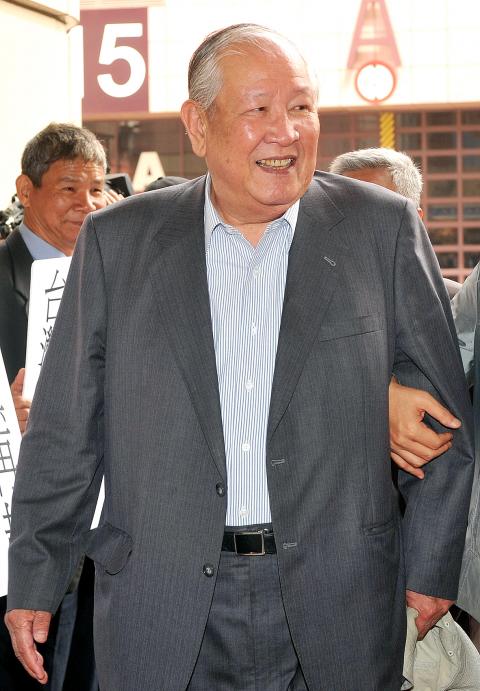Taiwan independence pioneer and World United Formosans for Independence (WUFI) chairman Ng Chiau-tong (黃昭堂) died yesterday from complications arising from sinus surgery. He was 79.
Ng was rushed to the National Taiwan University (NTU) Hospital in Taipei after suffering heart failure halfway through surgery at the Koo Foundation Sun Yat-Sen Cancer Center in Taipei earlier in the day.
Ng died of heart failure at around 11am, WUFI secretary--general Wang Kan-hou (王康厚) said.

Photo: Chien Jung-fong, Taipei Times
Taiwan Nation Alliance convener Yao Chia-wen (姚嘉文) said Ng’s death was totally unexpected.
“The Democratic Progressive Party [DPP] was grief-stricken to learn about Ng’s passing. He has devoted his whole life to Taiwan’s democracy and freedom and his spirit will live with us forever and call on us to fight for the well-being of the next generation. May he rest in peace,” DPP Chairperson Tsai Ing-wen (蔡英文) told reporters at a campaign stop before she visited Ng’s family at the hospital.
Ng’s passing is a “great loss for the Taiwan independence movement,” said Lee Yeng-chyh (李永熾), a history professor.
“Ng has never wavered in his support for Taiwan’s independence. We should remember him for his determination, perseverance and his love for Taiwan,” DPP Legislator Tsai Huang-liang (蔡煌瑯) said.
Tainan-born Ng was known for his decades of dedication to the independence movement. He was also one of the main organizers of the 228 Hand-in-Hand rally, widely seen as a crucial event contributing to former president Chen Shui-bian’s (陳水扁) re-election, when more than 1 million Taiwanese formed a human chain across the west coast on Feb. 28, 2004.
Born in 1932 during the Japanese colonial era, Ng went to Japan for further study after graduating from NTU in 1958. He began participating in the independence movement the following year when he was working on his master’s degree at then-Tokyo Imperial University.
He founded the Taiwan Youth Society, the forerunner of today’s WUFI Japan office, in 1960 in Tokyo. That act led to him being placed on a Chinese Nationalist Party (KMT) government blacklist, thereby barring him from returning to Taiwan.
Ng, who did not return to Taiwan until 1992, had served as WUFI chairman since 1995 and as a presidential adviser during Chen’s DPP administration.
A self-proclaimed supporter of “swift independence” when he was younger, Ng told the Taipei Times in an interview in August that his eventual goal would be “removing the ROC [Republic of China] political system, which was forced upon Taiwanese by the regime of Chiang Kai-shek (蔣介石) after the end of World War II.”
However, he later adopted a more moderate approach, saying that the removal of the ROC system would take time and could not occur without a healthy combination of domestic political development, global trends and, most of all, the consensus and will of the public.
“The ROC is like a cap on the top of our head. If it’s rainy, we’ll have to wear it for now, but we are waiting for a sunny day to take it off,” he said in the interview. “I am very optimistic. The Taiwan independence movement will succeed someday.”

CHAOS: Iranians took to the streets playing celebratory music after reports of Khamenei’s death on Saturday, while mourners also gathered in Tehran yesterday Iranian Supreme Leader Ayatollah Ali Khamenei was killed in a major attack on Iran launched by Israel and the US, throwing the future of the Islamic republic into doubt and raising the risk of regional instability. Iranian state television and the state-run IRNA news agency announced the 86-year-old’s death early yesterday. US President Donald Trump said it gave Iranians their “greatest chance” to “take back” their country. The announcements came after a joint US and Israeli aerial bombardment that targeted Iranian military and governmental sites. Trump said the “heavy and pinpoint bombing” would continue through the week or as long

TRUST: The KMT said it respected the US’ timing and considerations, and hoped it would continue to honor its commitments to helping Taiwan bolster its defenses and deterrence US President Donald Trump is delaying a multibillion-dollar arms sale to Taiwan to ensure his visit to Beijing is successful, a New York Times report said. The weapons sales package has stalled in the US Department of State, the report said, citing US officials it did not identify. The White House has told agencies not to push forward ahead of Trump’s meeting with Chinese President Xi Jinping (習近平), it said. The two last month held a phone call to discuss trade and geopolitical flashpoints ahead of the summit. Xi raised the Taiwan issue and urged the US to handle arms sales to

State-run CPC Corp, Taiwan (CPC, 台灣中油) yesterday said that it had confirmed on Saturday night with its liquefied natural gas (LNG) and crude oil suppliers that shipments are proceeding as scheduled and that domestic supplies remain unaffected. The CPC yesterday announced the gasoline and diesel prices will rise by NT$0.2 and NT$0.4 per liter, respectively, starting Monday, citing Middle East tensions and blizzards in the eastern United States. CPC also iterated it has been reducing the proportion of crude oil imports from the Middle East and diversifying its supply sources in the past few years in response to geopolitical risks, expanding

Pro-democracy media tycoon Jimmy Lai’s (黎智英) fraud conviction and prison sentence were yesterday overturned by a Hong Kong court, in a surprise legal decision that comes soon after Lai was jailed for 20 years on a separate national security charge. Judges Jeremy Poon (潘兆初), Anthea Pang (彭寶琴) and Derek Pang (彭偉昌) said in the judgement that they allowed the appeal from Lai, and another defendant in the case, to proceed, as a lower court judge had “erred.” “The Court of Appeal gave them leave to appeal against their conviction, allowed their appeals, quashed the convictions and set aside the sentences,” the judges